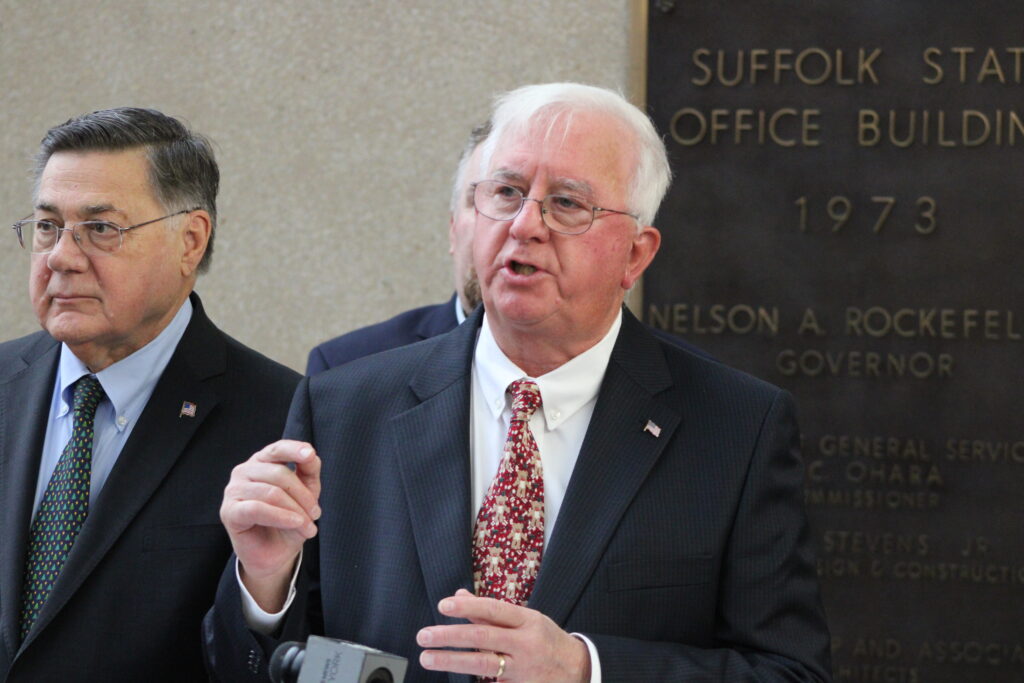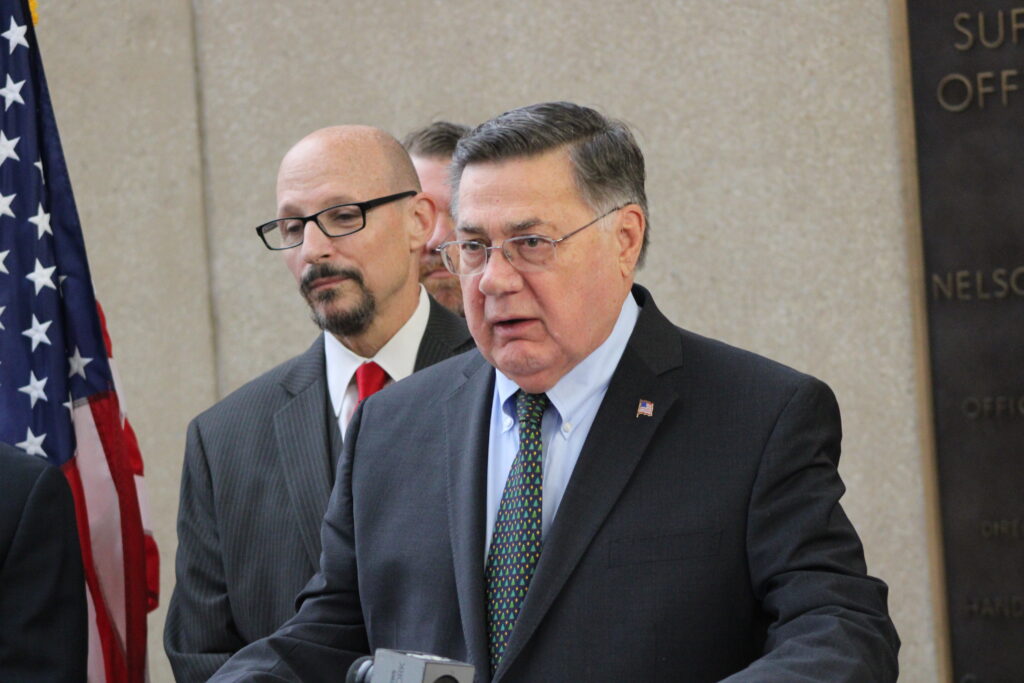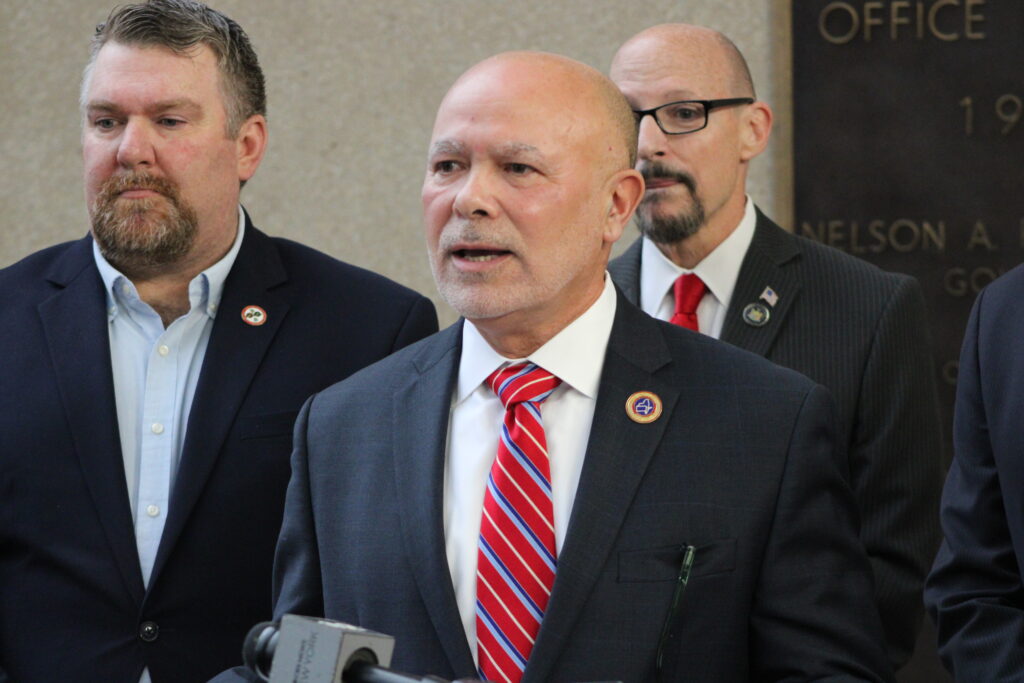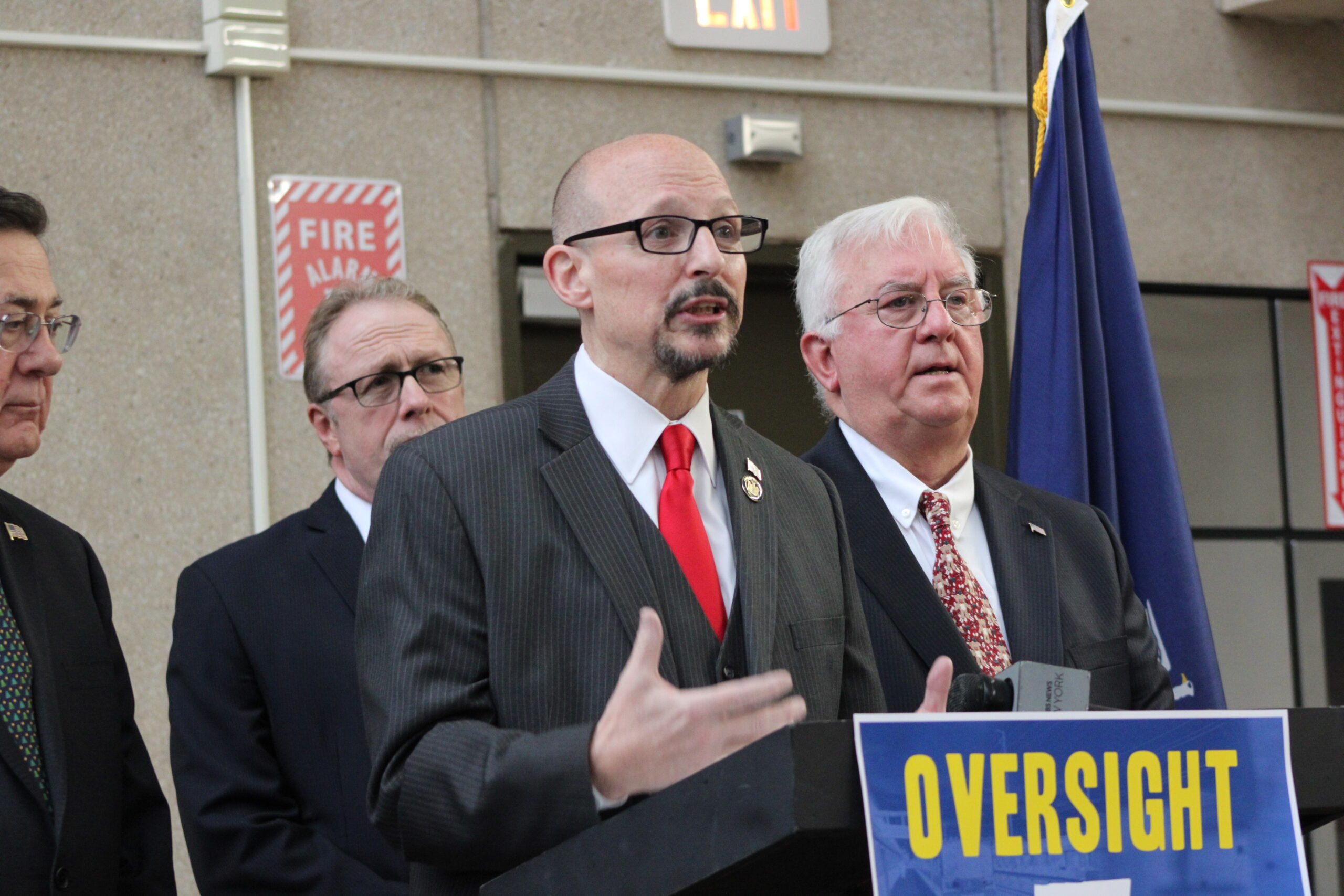Cover photo: Senator Murray unveils his bill to create an MTA Financial Control Board (Credit – Matt Meduri)
Suffolk’s proximity to New York City and its status as a “bedroom community” of the Big Apple has its payoffs, as well as its taxes.
More specifically, taxes to the Metropolitan Transit Authority (MTA), the largest mass transit system in North America and one of the largest in the world. For context, the New York City Subway system is the world’s largest by number of stations – 472 – and is the eighth-largest subway system in the world by annual ridership, according to the MTA itself.
However, fiscal irresponsibility is being alleged by Republicans and Democrats alike, with Governor Kathy Hochul (D) receiving much criticism over her decision to reinstate the congestion tax plan, which was indefinitely shelved over the summer in a move that many believed to be an election season bait-and-switch.
Senator Dean Murray (R-East Patchogue) has announced that he will introduce legislation in the upcoming session of the State Legislature to institute an MTA Financial Control Board.
The board would be mandated to vote in unanimous decisions so as to ensure a “broad consensus,” according to Murray. The board would have the authority to review and approve financing and construction projects proposed by the MTA, requiring prior approval before the MTA can enter into agreements or incur debt. Additionally, the board would be permitted to request information from State Comptroller Tom DiNapoli (D-Great Neck Plaza) to assess financial feasibility of proposals
Murray’s legislation offers a grandfather clause to existing contracts, in that the board would have to honor all existing contracts and would not have the ability to alter them, but would participate in negotiations of future contracts.

Finally, Governor Hochul would have the authority to remove any board member determined to be acting beyond his or her legal scope.
Murray was joined by fiscal watchdog Suffolk County Comptroller John Kennedy (R-Nesconset) (pictured above), Suffolk County Executive Ed Romaine (R-Center Moriches), as well as labor leaders who feel that the MTA and the State have passed the buck to them, blaming laborers and labor groups for the cash pitfall in which the agency currently finds themselves.
“For far too long, the MTA has been mismanaged. There has been fraud, waste, abuse, but yet, continually, year after year, they come to Albany, hat in hand, saying, ‘give us more, give us more.’ Well, our answer now is, ‘clean up your own fiscal backyard first before you ask for more.’”
Murray painted the picture with what he called a “perfect example” of the MTA’s fiscal irresponsibility: fare evasion statistics.
In 2017, the MTA lost $150 million in revenue due to fare and toll evasion. In 2018, that number almost doubled to $290 million.
“You would think at that point they would say, ‘boy, we’d better do something. We’d better fix this problem.’ You would be wrong. They didn’t,” said Murray.
In 2019, lost revenue due to fare evaders doubled again, this time to $525 million, to which Murray points out that the MTA “still took no action.” In 2020, during the peak of the COVID-19 Pandemic, the lost revenue figures stayed the same, and actually decreased to $500 million in 2021.
“At this point, you think, ‘surely they’ve taken action,’” said Murray. “You would be wrong again.”
In 2022, the number increased to $700 million, and 2023 saw the largest loss in revenue to fare evasion yet: $750 million.
“That is money that the MTA should have had in their hands, and they watched and did nothing as people jumped over turnstiles and drove through their tolls without paying. How can you, in one hand, watch that money disappear, and in the other hand come and ask for more money?” said Murray.
However, Murray says that while the irresponsibility is glaring, insult was only added to injury when the MTA began stating that without fare hikes and more money from Albany, infrastructure would deteriorate and service would be considerably kneecapped.
“If I didn’t know better, I’d think I was reading Oliver Twist,” quipped Executive Romaine (pictured below), adding the famous quote, “Please, Sir, I want some more.”

“No one minds investing in railroad service; we want to make sure that the general public has convenient public transportation,” said Romaine. “But when you have $750 million in one year in fare evasion, when you have overruns of overtime, when you have station maintenance that seems to be neglected depending on the station, maybe it’s time for someone from an outside agency to take an independent look and hold the MTA accountable.”
Murray plans to carry the bill in the Senate, with Assemblyman Keith Brown (R-Northport) poised to take it up in the Assembly.
Murray remarked that his first action upon taking office in 2010 – as the first Tea Party-affiliated candidate to win elected office in the country – was to request a forensic audit of the MTA by Comptroller DiNapoli, who has shared the same concerns about the MTA’s fiscal state.
Out of the many audits that have been conducted over the years, Murray mentioned one: the 2009 audit. It found that advertising agencies shorted the MTA by not paying $18 million in advertising revenue, primarily going to billboards along the railroad.
“How do you miss $18 million, while on the other hand, you’re asking for hundreds of millions more from taxpayers and businesses?” said Murray. He added to the pattern of irresponsibility by discussing a recent story of an MTA employee who was busted swiping two cards to effectively work twenty-four hours per day, seven days per week.
“No red flags came up?” asked Murray, who, along with labor leaders present, said that “there is no oversight” at the MTA.
However, Murray took specific issue with the litany of taxes residents and businesses face just to keep the MTA in business.
“The MTA payroll tax was put in place over a decade ago,” said Murray, adding that he and then-Senator Lee Zeldin (R-Shirley) fought to get rid of most of it. They succeeded, but about 20% of the intended original tax remains in place. “The MTA payroll tax is still in place for large employers, self-employed, local governments, hospitals, and community colleges. The MTA also gets money from state mortgage recording taxes and even cell phone fees. Go home and take a look at your cell phone bill. Every month, there’s a line where you’re paying the mobility tax for the MTA.”
“Urban tax, mansion tax, corporate tax surcharge, regional sales tax, Internet marketplace tax, motor vehicle license and registration fee, hailed vehicle trips, passenger car rental tax,” said Murray.
“Are you getting tired of hearing these? I’m getting tired of paying them.”
“Suffolk County sends $22 million to the MTA for the maintenance and upkeep of stations, some of which don’t even have an enclosure in order to keep people out of the elements of the weather,” said Comptroller Kennedy. “The bathrooms half the time are abysmal, and we were charged full boat even during COVID, when they were locked and closed. This is a matter of equity, this is a matter of fairness, and this is a matter of resolve. Clearly, the MTA board is either incapable or unwilling to take the firm action necessary to stop the arterial bleeding.”
Murray also notes that overtime salaries are another problem ballooning costs, accounting for $849 million in 2014, but it reached a record high of $1.42 billion after COVID. The point is used by the MTA against the workers.
“Labor doesn’t walk up and say, ‘I’m going to work overtime,’ they are asked to work overtime by management,” said Murray. “But why are we relying so much on overtime and not hiring more workers to get the job done?

Ricardo Sanchez (pictured above), Chairman of the International Brotherhood of Electrical Workers (IBEW) Local 589, spoke to this issue specifically.
“Labor is not the problem. Management’s the problem,” said Sanchez, adding that while management shows “contempt” for the taxpayers, the body shows even more contempt for labor.
“They sit there and they pay us no attention. And they sit there and they paint the picture that the problems are labor and overtime. This legislation is past due; we’ve been sending the same message for thirty years,” said Sanchez.
“Why is labor here? Labor is here because we’re kind of tired of the narrative that we did this,” said Michael Sullivan, Chairman of the Brotherhood and Railroad Signalmen (BRS).
Regarding executive salaries, Murray said that no public workers should be making more money than the governor, who makes $250,000 annually.
“We have an MTA that could be absolutely amazing. We could be so proud and leading the world, but we’re not and you have to ask yourself, ‘why not?’ and it comes down to management. This isn’t something that just popped up; it’s systemic.”






